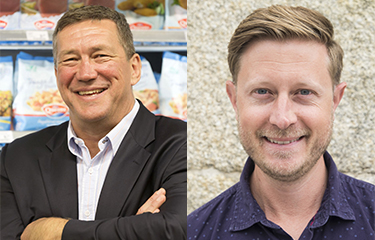Op-ed: Seafood business action on human rights is essential

Chris Ninnes is CEO of the Aquaculture Stewardship Council. Brad Spear is global policy director at Sustainable Fisheries Partnership. ASC and SFP are members of the Certification and Ratings Collaboration.
Around the world, seafood production supports more than 600 million livelihoods and feeds more than 3 billion people. Yet significant social responsibility challenges exist in the supply chains of wild-caught and farmed seafood products from around the world.
These challenges include forced and child labor, egregious working hours, hazardous working conditions, low incomes, inequitable access to markets, discrimination, gender inequality, and resource use conflicts impacting local and Indigenous communities. Most critically, they impact the lives and livelihoods of employed workers, small-scale fishers, and smallholder farmers. For seafood businesses, they can also have major reputational, financial, and legal implications.
We share widespread concerns regarding these social responsibility challenges in the seafood industry. These issues and their driving factors are complex, as are seafood supply chains. A range of actions, individual and collective as well as regulatory and voluntary, are needed to support the individuals and communities that benefit from and are impacted by seafood production.
The Certification and Ratings Collaboration has created an interactive data tool that compiles and displays data from government and civil society sources about human rights abuses and risks in the seafood sectors of 92 seafood-producing countries. The analysis of the data finds that as of August 2023, 65 percent of the countries assessed have documented evidence of forced labor, child labor or human trafficking in their seafood sectors while 16 percent of countries assessed have significant risk factors for human rights abuses, including flags of convenience and evidence of illegal fishing. Additionally, 97 percent of countries assessed have not signed all of the key International Labor Organization conventions and global treaties that demonstrate their commitment to upholding international standards for human rights protections. While the tool does not track production by fishery or farm, companies doing business in countries with evidence or risks documented by the tool must make it their business to understand social issues in the fisheries and farms they source from and drive improvements where needed.
All seafood businesses have legal and moral obligations to uphold human rights. The U.N. Guiding Principles on Business and Human Rights state that “the responsibility to respect human rights is a global standard of expected conduct for all business enterprises wherever they operate. [This responsibility] applies to all enterprises regardless of their size, sector, operational context, ownership, and structure.” An evolving landscape of legislation is shifting that responsibility into a legal requirement, in particular with regard to transparency and human rights due diligence.
The U.N. Guiding Principles define three concrete steps seafood businesses can take to protect human rights:
- A policy commitment to meet their responsibility to respect human rights;
- A human rights due diligence process to identify, prevent, mitigate, and account for how they address their impacts on human rights;
- Processes to enable the remediation of any adverse human rights impacts they cause or to which they contribute.
Many organizations are contributing to efforts that protect the rights of and deliver benefits to fishers, farmers, and seafood workers while also being practical for businesses to implement. The active community of human rights, labor rights, and worker organizations has decades of experience in strengthening human rights protections in seafood, agriculture, and other sectors. Their expertise must guide broader action in the seafood sector.
Individually, our organizations offer a range of tools including risk indicators, certification programs, research, and on-the-ground improvement efforts that help to support different parts of the seafood supply chain to take action on social responsibility. Along with two other members of the Certification and Ratings Collaboration, we have created a guide for seafood business action that includes additional details and resources for businesses. While the guide is most relevant for companies across the supply chain that buy seafood, seafood producers may also find the resources and recommendations helpful.
The responsibility of all seafood businesses to act to address social responsibility in their operations and supply chains is clear. Our organizations are committed to supporting seafood businesses at all levels of the supply chain to take action that creates positive change for seafood workers, small-scale fishers and smallholder farmers, and their communities.
Photos courtesy of Aquaculture Stewardship Council, Sustainable Fisheries Partnership





Share